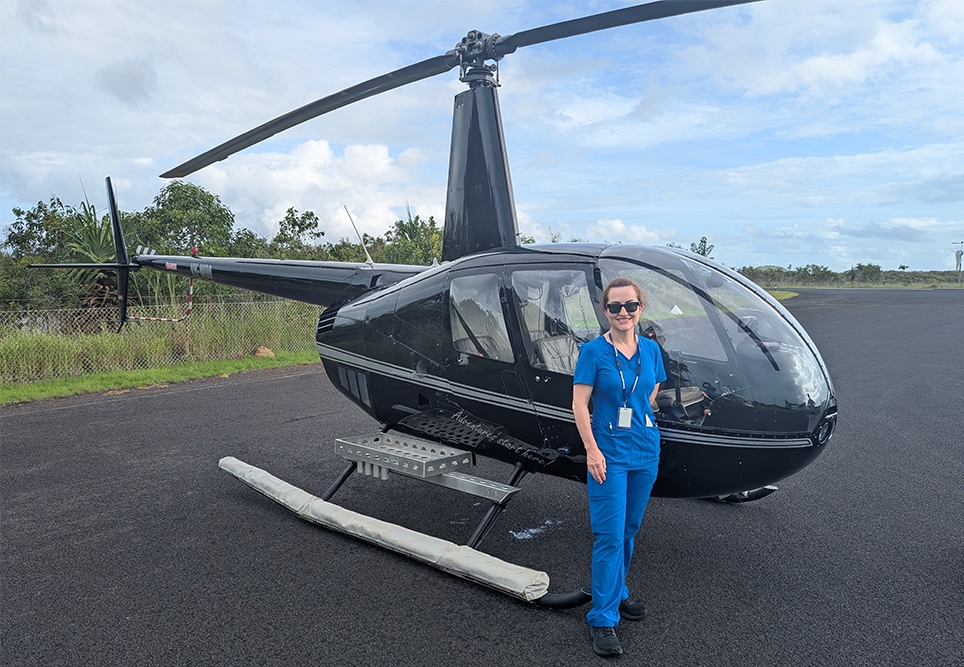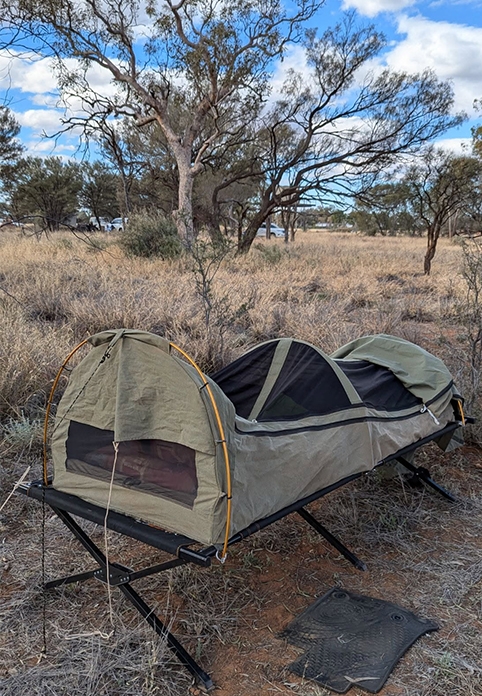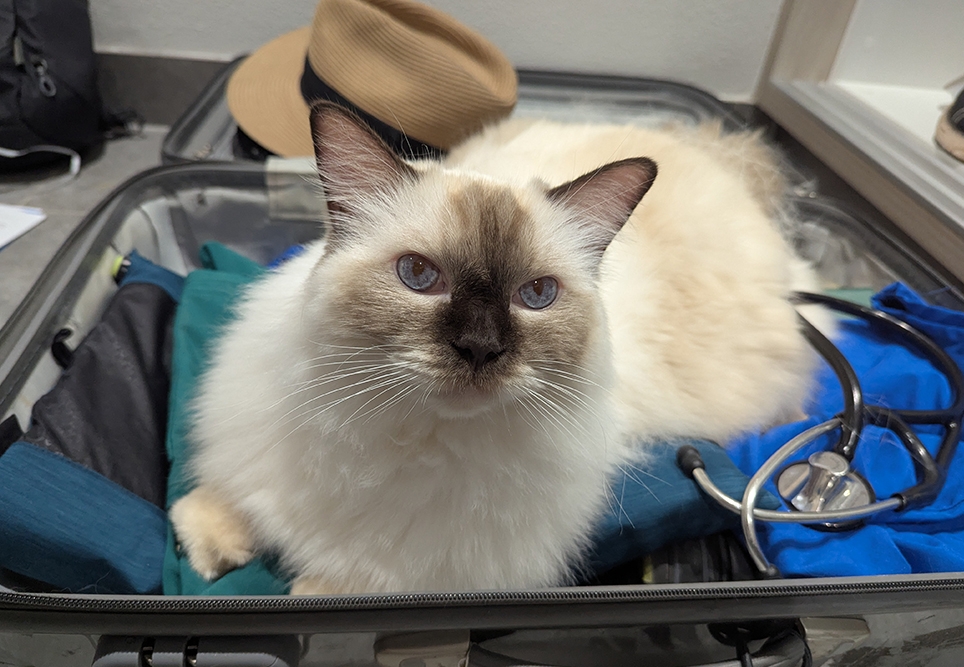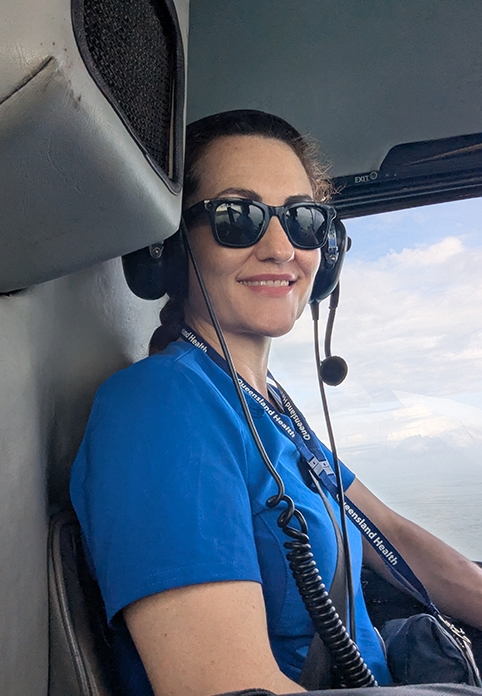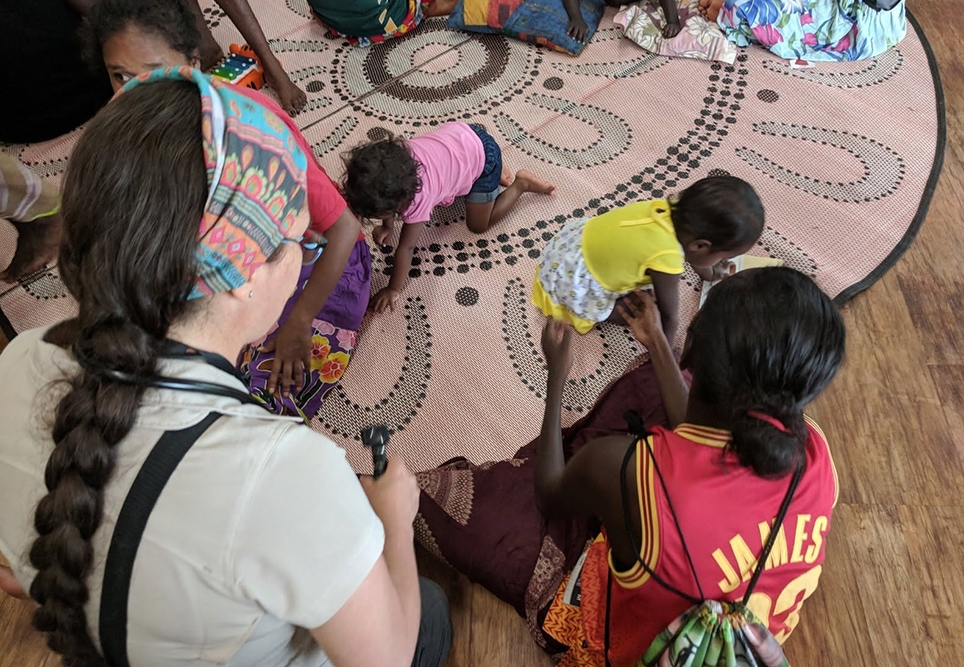This site may not work properly using older versions of Edge and Internet Explorer. You should upgrade your browser to the latest Chrome, Firefox, Edge, Safari, or any other modern browser of your choice. Click here for more information.
Your Stories
This is where we tell your stories, cover topical issues and promote meaningful initiatives.
Don’t forget your goggles, coral and a motorbike!
CRANAplus Member, Dr Kirsten Due, strives to find treasure amongst the difficulties of remote work. With the wisdom of remote nurses and doctors she’s met along her career, she’s compiled a packing list to fill our cognitive suitcases with joy.
I have a mental image of hundreds of remote nurses and doctors criss-crossing the deserts and rainforests of Australia in teeny Cessnas and on jets; in buses, trains and 4x4s.
And maybe on foot if you’re unlucky and bust both those Bridgestones on your Land Cruiser or put petrol in the diesel. Ouch $$. But like ‘ships in the night’ we don’t often meet up.
If you’re like me and work in a number of different communities, then chance encounters with colleagues at airports and brief conversations over hurried lunch breaks might be all you get as far as conversation with like-minded people. Every time I bump into a nurse or doctor who does remote work, we end up talking about similar things. Top of the list would be:
- Latest news about communities we’ve worked on (who has retired/retrained/remarried/adopted rescue cats).
- What’s going on in relation to safety in the town/community and how to avoid getting into trouble.
- Nifty gadgets to pack and ways to make life more comfortable/interesting/fun.
Working in remote areas – where life may be anything but comfortable and fun – has taught me about the best and worst in myself and others. When I least expect it, the stress and isolation and unavoidable workplace frictions, as well as the lack of sleep and very real fears about safety, mean the side of me that is grumbly, ungrateful, teary and demanding can pop up at any time.
It’s a side I keep under wraps even from myself. But our emotions and reactions, when they come out of the blue, are worth listening to.
Over the last 20 years, I’ve collected little gems of pocket wisdom shared by nurses and doctors. Ways of thinking and relating that are nuggets of gold which help me navigate the difficulties: the internal and external deserts.
I don’t just want to survive difficulty – I want to find treasure in the midst of it – and have a whole lot of fun doing it.
I like to think of these treasured gems and precious tips as things I can pack in my ‘cognitive suitcase’ to ‘spark joy’ while I’m away.
Joy instead of cynicism. Joy instead of helplessness. Joy instead of burnout. No one has an empty suitcase of beliefs and habits. Everyone carries baggage – that’s a good thing. But sometimes it’s worth checking out what’s weighing you down and replacing it with something lighter and more functional.
Even if you’re living in a community full time and call The Red House at Lot 104 Desert Track Road your home, then taking the time to foster healing habits of mind is important. What is in our ‘cognitive suitcase’ has an impact on our health.
Even if you’re a traveller like I have been in the past, with a swag or a camper van, then making your inner (and, therefore, outer) environment a comfortable and joyful place can be a calming and centring practice.
Here are a few memorable things – maybe even life-changing things – that nurses and doctors have told me they pack when they travel. I’ve adapted them to suit me – especially the first one because I’m a swimmer. The idea came from a nurse who lived right in the centre of Australia…
Remember the tinted goggles
I pack a pair of blue goggles to remind me that how I see things habitually is just one way of viewing the world around me. It’s easy for me to develop an outlook that categorises people and situations based on my fears and past experiences. The goggles remind me that I can be metacognitive – that even if I can’t change my perspective on life right now, I can acknowledge it exists.
Remember the monofilament
I don’t actually carry a Semmes-Weinstein monofilament, although I know a stack of people who do. Diabetic foot disease is skyrocketing. But when I use a mono-filament, I remember the saying that unless you’ve walked a mile in someone else’s shoes you don’t really understand them. The saying came from a poem called Judge Softly, written in the 1890s by Mary Lathrap. Even though the writing is archaic, I suggest looking it up in full.
The first few verses go like this:
Pray, don’t find fault with the man that limps, Or stumbles along the road.
Unless you have worn the moccasins he wears, Or stumbled beneath the same load.
There may be tears in his soles that hurt Though hidden away from view.
The burden he bears placed on your back
May cause you to stumble and fall, too.
Don’t sneer at the man who is down today Unless you have felt the same blow
That caused his fall or felt the shame
That only the fallen know.
You may be strong, but still the blows
That were his, unknown to you in the same way, May cause you to stagger and fall, too.
Most patients I see don’t have shoes. Most staff I see do. I find it easy to judge both. Especially if I’m tired and there are pre-existing rifts and seemingly unfair dynamics. The imaginary monofilament helps me navigate tricky personalities with a bit more openness and empathy.
Pack a piece of coral
A few people I’ve met travel with a reminder of a favourite place. One nurse keeps a piece of coral in his pocket from his favourite beach at home. When stressed, he puts his hand in his pocket and is reminded that just a plane flight away is a place he loves. A place with soft breezes and palm trees. But he has – for important reasons – chosen to be elsewhere for a time. His special place will always be there.
Maybe it’s a café with friends. Maybe it’s in front of the telly with your partner and grandkids. Wherever it is, pack something to remind you that there are good things around the corner.
An achievable goal
There are a stack of things I can’t do when I work away.
On some of the remote islands and central desert places, I can’t go for long walks by myself; I can’t go to the shops in gym gear; I can’t even go to the gym because there isn’t one; I can’t get in the car and go for a drive because despite having ‘access to a vehicle’ written in my contract, there aren’t enough in working order to go round.
Pondering all the things I can’t do doesn’t get me anywhere good. So instead, I make a list of things I want to bring back. Not paintings and statues. But things that no one can take away.
Last time I took a skipping rope and a goal to complete 100 skips without ending up in the emergency department. Whenever I walked past it, I made myself increase the number I could skip. I went from 5 to 400 jumps (with just a few abrasions). Someone I know sets a goal to read a classic novel every eight weeks away and so far he has read everything from War and Peace (Tolstoy), Middlemarch (Eliot) and most of Shakespeare. So what? Well, this is a guy who grew up reading comics and failed English Literature at high school. Someone else I know taught themselves enough Japanese over a year of remote work to travel solo through Japan and be reasonably well understood. There are many things you can’t do when you’re away, but a heck of a lot you can do if you receive the potential isolation and ‘limitations’ as a gift.
A motorbike (?!)
I wish I could really pack one. Instead, I have a few old photos on my phone and I suspect they’re lost somewhere amongst pictures of our pets. I’ve had six motorbikes in the past. The one that scared the day-lights out of me was a big red shiny VFR 800. Next to the bike I was knee high to a grasshopper. As a novice rider years before, my bike instructor told me I had to learn to “lean into the discomfort”. He understood that riding was a frightening experience. And that cornering didn’t come naturally.
I had to learn to lean into the discomfort of cornering while keeping my head fixed on my goal. It’s a great way to think about life. Trying to make things perfect, trying to avoid our fears and losing sight of where we’re going is a hazard. You only get where you want to go when: a) you have a vision for the future/know where you want to go; and b) when you learn to accept that with all worthwhile pursuits there will be discomfort. You master one corner and there will be another and another. Safe riding and wise living is about knowing limitations, having wise teachers, and sometimes about being comfortable with being uncomfortable. As long as that is in ways that will in time see us and those around us thriving.
Whether we realise it or not, well before we pack our old boots, fly spray, floppy hat and scrubs in our travelling bag, we have already taken up a huge amount of space with mental habits. It’s worth spending time thinking about what they are and deciding whether swapping them out for something more useful might be a better idea. Pack things in your life that don’t weigh you down. Fun/wise/creative ways of looking at and doing life.
Dr Kirsten Due
FRACGP FACRRM Dip Pal Med
BPsych Hons 1st Class
Kirsten is a SMO who works between various Aboriginal and Torres Strait Island communities across Australia. She was born in Africa and spent her early years in Somalia and Christmas Island. Her involvement with remote Indigenous communities started in her teenage years and has continued since then. Kirsten is especially passionate about the central place of rural and remote nurses who she says are the heartbeat of remote medicine. Her inspiration comes from her husband and from two extraordinary women … Robyn Miller (The Sugarbird Lady) a flight nurse and a pioneering aviator and Ida Scudder, one of the first female doctors who was born in South India in 1870 and the founder of CMC Vellore.
